







PAGE


Investing in Topeka
Six local organizations are investing in innovative changes that will enrich how Topekans live, learn and play.










PAGE


Six local organizations are investing in innovative changes that will enrich how Topekans live, learn and play.

When

• Home Health
• Hospice
• Staffing
• Med Reminders
• Transportation
• Companionship
• Meals
• Bathing
• Dressing
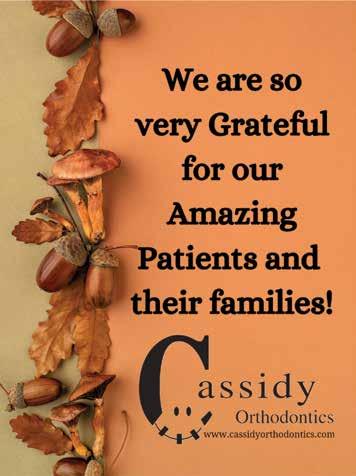

The Kansas Chamber of Commerce marks 100 years of advocating for local businesses through policy change and economic growth.
Rising costs are leading Kansans to put their health on hold. Here’s what businesses can do to support wellness among their teams.
The Jayhawk Area Council Boy Scouts of America shine a spotlight on 20 local young professionals who are leaving a lasting impact on the city they call home.
A Washburn University business professor explores how the government can use tried-and-true business strategies to become more efficient.
Golf simulators, ambient lighting and the Frank Sinatra experience: how local installation business Electronic Life is making Topeka homes smarter.
From Ronald McDonald House to TEDxTopeka, the founders of Meridian Roofing Solutions are devoted to Topeka’s future.
Kansas Insurance Commissioner Vicki Schmidt reflects on her unexpected journey and the meaning of community service.





PUBLISHER Braden Dimick & SALES DIRECTOR
braden@tkmagazine.com 785-438-7773
CREATIVE DIRECTOR & DESIGNER
Janet Faust
EDITOR Lauren Jurgensen
COVER PHOTOGRAPHER John Burns
CONTRIBUTING WRITERS Lauren Jurgensen
Lisa Loewen
Samantha Marshall
Danielle Martin
India Yarborough
PHOTOGRAPHERS
John Burns
Braden Dimick
Brian Peters
Dane Stephenson
CONTRIBUTING EXPERTS
WEBSITE MANAGER
Matt All
Michael Austin
Cordell Dimick
2024 TK Business Magazine is published by E2 Communications, Inc., 7537 SW 26th St., Topeka, KS 66614. 785-438-7773. Reproduction or use of this publication in any manner without written permission of the publisher is prohibited.
Every effort was made to ensure accuracy of the information in this publication as of press time. The publisher assumes no responsibility of any part for the content of any advertisement in this publication, including any errors and omissions therein. E2 Communications, Inc. makes no endorsement, representation or warranty regarding any goods or services advertised or listed in this publication. Listings and advertisements are provided by the subject company. E2 Communications, Inc. shall not be responsible or liable for any inaccuracy, omission or infringement of any third party’s right therein, or for personal injury or any other damage or injury whatsoever. By placing an order for an advertisement, the advertiser agrees to indemnify the publisher against any claims relating to the advertisement.









DOCTORS
Bruce
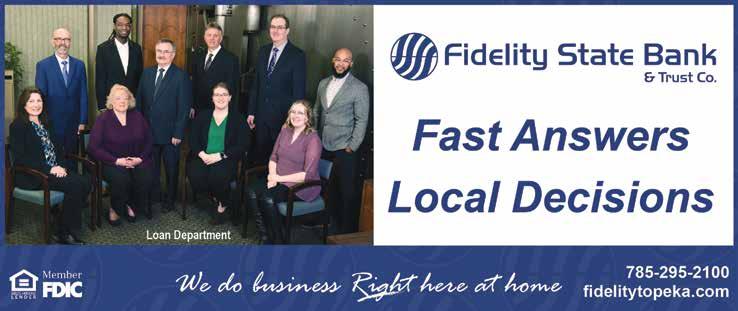
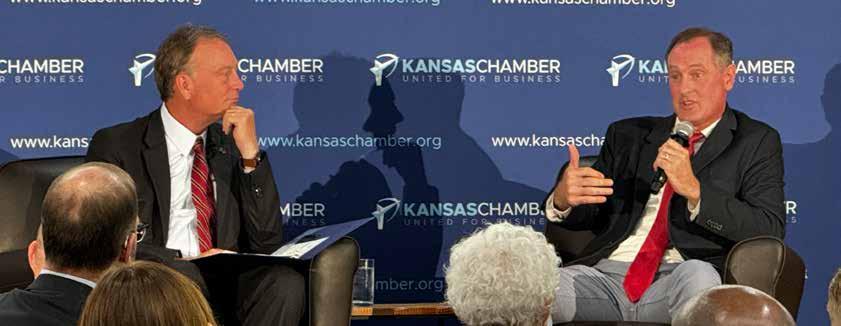

By LAUREN JURGENSEN





“Influencing policy is what we do.”
— Alan Cobb President and CEO Kansas Chamber
2024 marks the centennial anniversary of the Kansas Chamber of Commerce. The Chamber has experienced remarkable change — and remarkable progress — throughout its busy century of advocating for the state’s business community.
“Influencing policy is what we do,” said Alan Cobb, president and CEO of the Kansas Chamber. “Some of the most significant accomplishments include eliminating property tax on machinery and equipment, eliminating the franchise and estate taxes, modernizing and improving our unemployment insurance system and tax structure, occupational licensing reciprocity, reducing the state regulatory burden and transparency in property tax hearings.”
Since day one, the Chamber has represented local business interests at the legislative level. That began in 1924 when a group of road contractors, who sought to bring better highways to Kansas, founded the Kansas Association of Chambers Commerce to advocate on their behalf.

One hundred years later, the Chamber campaigns for businesses across every industry and sector.
“We have a much more diverse membership than we did originally,” Cobb said. “Our state is home to businesses, many that have been open for more than 100 years, whose ingenuity and craftsmanship have impacted millions around the world. I always am impressed to learn how the Kansas Chamber worked alongside them to keep their operations going through the good and bad times: depressions, tornadoes, floods and world wars.”
The Kansas Chamber may look different now than it did a century ago, but that’s because it’s exploring a new and exciting economic frontier. Cobb said the next century will be different than the last because every state is working fast to become the most attractive place to do business.
“Whether the issue is workforce, taxes, regulation or legal reform, Kansas stands in the middle of the pack,” Cobb said. “We have to do better.”

A passion to do more for Kansas is what’s driving the Chamber’s Vision 2030 plan, a proposed ten-year comprehensive strategy they hope will make Kansas more competitive.
“Legislators and governors come and go,” Cobb said. “The Chamber is constant. Nobody else is putting forward a vision for the state, so the Kansas Chamber will.”
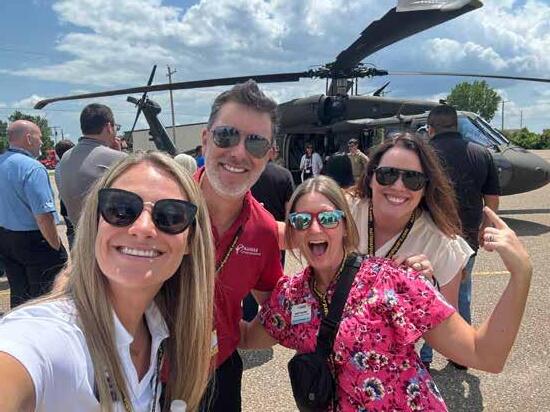
He added that Vision 2030 will encourage entrepreneurship, innovation and even risk-taking.
“Risk-taking was how Kansas began and grew,” he said. “We must continue to foster such an environment.”
Local businesses across the state are sharing words of gratitude and
respect in celebration of the Kansas Chambers’ 100 years of community service.
“For 100 years, the Chamber has been a cornerstone of support and growth for Kansas businesses, showcasing unwavering dedication to our state’s economic vitality,” said Heather Jantz of MJE, LLC.
Josh Shorter of Integrated Components said he appreciates

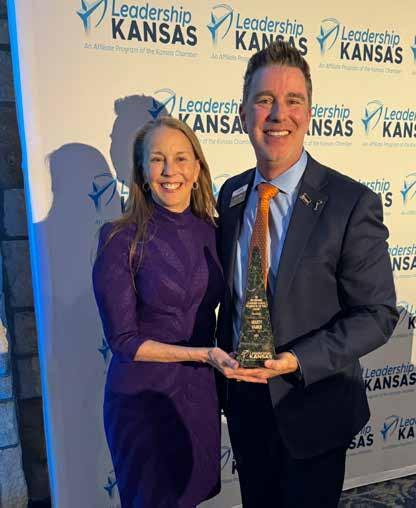
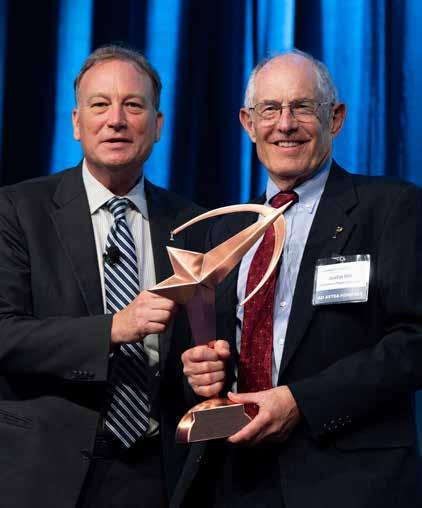
how the Chamber has always championed practical and common sense business policies.
“We appreciate the Chamber’s dedication to advocating for free, competitive enterprise in Kansas, defending against ideas inconsistent with that.”
— John Guyot Senior Vice President, General Counsel and Secretary Security Benefit
“The work done by the Chamber and its staff is invaluable to us as a business in Kansas,” he said. “We look forward to many more years of collaboration with the Kansas Chamber.”
Some business leaders were quick to praise the positive impact of the Chamber’s policy work.
“As a longtime member, we appreciate the Chamber’s dedication to advocating for free, competitive enterprise in Kansas, defending against ideas inconsistent with that,” said Security Benefit’s John Guyot.
Beau Jackson of Husch Blackwell agreed. “No organization in the state has fought harder for free and fair enterprise and the rule of law, the bedrock foundations of a prosperous
economy,” he said. “As a heartland-based law firm whose clients have benefited from such tireless efforts, we salute the Chamber and emphasize our excitement to continue working together.”
Adecco USA’s Shirley Martin-Smith said the Kansas Chamber’s Leadership Kansas program, which was established in 1979 to inspire upcoming generations of state business leaders, is one of the Chamber’s hallmark achievements.
“The program attracts future leaders,” Martin-Smith said. “It provides them with so much information about our state and the importance of understanding and protecting what makes Kansas a great place to live and do business.”
The history of the Kansas Chamber has been the history of



rising and adapting to even the toughest economic challenges.
“The Kansas Chamber has been innovative,” said Matt Cortez of GLMV Architecture. “They’ve sought solutions for the removal of barriers to our industries and businesses.”
Big challenges may lie ahead, but it’s often the challenges that prove the greatest opportunities for improvement. Cobb said he’s optimistic about where both the Chamber and Kansas are headed.
“We have one of the best states in America,” Cobb said. “But Kansans by nature aren’t very good at tooting our own horn. We just put our head down and get to work. If states like North Carolina can go from one of the worst to one of the best states to do business, so can Kansas.”
He credited the business community of Kansas for the Chamber’s longevity.
“The Kansas Chamber reached this important milestone because of the ongoing commitment and strong support of our members,” Cobb said. “We are fortunate to have worked with thousands of business leaders, entrepreneurs and elected officials who believed Kansas needed a competitive business environment so every business and Kansan could succeed.”
Cobb offered some precious advice for future business leaders.
“Be humble, patient and never stop learning. Assume change will happen,” he said. “While your job may not change a lot, how you do your job will. And many young leaders will be in a completely different field than where they started. Live beneath your means as best as you can. Assume the best in people, especially your work colleagues, as it relates to your career.”
The Chamber continues to celebrate its 100th anniversary throughout the year with historical look backs, special gatherings and recognition of members. TK


President and CEO
The cost of health care remains a top issue of concern for Kansas residents — second only to inflation, according to a new survey commissioned by Blue Cross and Blue Shield of Kansas (BCBSKS).
Even more troubling is that because of the cost of care, half of Kansans have delayed seeing a doctor or going to a hospital.
As a Kansan, this is unacceptable. As a leader of a health plan, I am deeply invested in working to control health care costs while still providing a great value for our members. It’s about striking the right balance between efficiency and value.
The survey revealed an immediate need for everyone in the health care community — from health plans to policymakers to hospitals — to keep costs and affordability in mind.
4 KEY TAKEAWAYS IN THE SURVEY
Health care costs for copays and bills are viewed as a problem for nearly four out of five Kansans, trailing only the cost of groceries and gas.
Forty-five percent say hospital bills have increased a lot in the last few years. Residents report seeing hospital bills rise faster than insurance premiums and copays.
When it comes to the topic of health care, cost is overwhelmingly the most important issue, topping quality of care, access to care and equity of care by an almost 2-to-1 margin.
Fifty-one percent of Kansans occasionally or regularly put off hospital care because of the cost.


This information is likely alarming for employers. You want your employees to be healthy and at the top of their game, and these findings show their long-term health could be in jeopardy. Below are some of the steps you can take to foster employee health and wellness:
Encourage preventive screenings and routine doctor’s visits.
Encourage telehealth options, which are available 24/7 and may help avoid ER visits.
Offer flu vaccine clinics in your office.
Support work-life balance by offering flexible schedules, telecommuting options and wellness programs.
Encourage physical activity. Regular breaks and even group exercise sessions are a great way to accomplish this.
Consider offering fitness incentives. BCBSKS offers the STRIVE program to provide wellness and fitnessrelated challenges.
Speak with your health plan provider to see what services they offer to assist your employees. BCBSKS, for example, has a Wellness Team that can work with employers to help in the creation of a worksite wellness program.
Check your health plan to see what types of case management options are available. BCBSKS offers a disease management team to help members manage symptoms and diseases such as asthma, diabetes, COPD, high cholesterol and high blood pressure.
Offer educational opportunities for your employees to learn how their health plan benefits can protect their health and finances. BCBSKS offers services like SmartShopper, as well as supplemental cancer and hospital plans, all of which can help cover out-ofpocket expenses.

Those of us who work in health care have a responsibility to do what we can to reduce spending. Here’s what BCBSKS is doing to lower health care costs:
Improving value. We’re partnering with hospitals and providers to agree on contracts that incentivize high-quality care and services, which have been shown to reduce costs and improve value.
Collaboration. We’re working closely with hospitals and physicians on contracts that protect families and businesses from unsustainable price increases, while enhancing the overall value of services.
Ensuring affordability. We’re protecting families and businesses from unsustainable price increases to ensure they receive maximum value for their health care expenditures.
Addressing prescription drug costs. We’re ensuring members receive high quality, clinically appropriate prescription drugs through value-based contracts, rebates and partnerships to enhance value and manage costs.
Efficient use of premiums. Of every insurance premium dollar a BCBSKS member pays, 89 cents go directly to member care via claims from health care providers.
It will take everyone working together to ensure Kansans are getting the services they need and the health care they deserve. BCBSKS is committed to working with others in health care to reduce spending while delivering exceptional value to members. TK
Survey Methodology: A total of 1,032 Kansas adults were interviewed for this survey between June 11 and June 21, 2024. The survey was conducted using a mixed methodology approach with approximately one-quarter of the interviews conducted by live interviewer telephone calls and three-quarters via a representative online panel. Slight weights were used to bring the demographics of the sample in line with the actual demographics of Kansas.

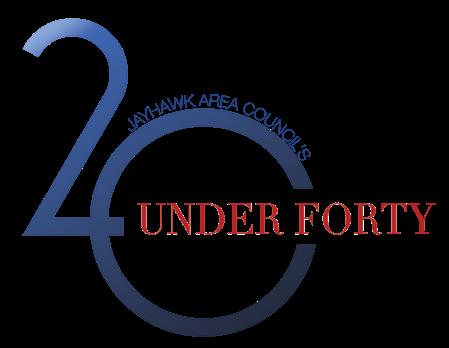
Written
and compiled by
KELLY POTTER and LAUREN JURGENSEN
BURNS
As 2024 comes to a close, the Jayhawk Area Council Boy Scouts of America honors the “Top 20 Under 40” who proudly represent Topeka’s new generation of business leaders.
These remarkable young professionals hail from diverse backgrounds and industries, yet all are committed to making a positive and lasting impact on their community. Here’s a look at each of their stories.

Thomas L. Bell
N. Larry Bork
Tracy A. Cole
Miranda K. Carmona
Samuel R. Feather
Jessica L. Freeman

Susan L. Mauch
David P O ’Neal
Patrick M. Salsbur y
Cynthia J. Sheppear d
Andr ew D. Tague
Catherine L. Walber g



What three critical skills have helped you in your work?
Having a vision, because it’s important to know where you want to go and to strategically consider how you will get there. Empathy, because you have to build understanding when working with and serving people from different
backgrounds. Finally, critical thinking, because problems come up every day and you have to learn how to tackle them, no matter how large or small.
What motivates you?
My daughters motivate me every day to set the best possible example so they will grow up
Director, Aleshire Center for Leadership and Community Engagement Washburn University
Lauren is the director of the Aleshire Center for Leadership and Community Engagement at Washburn University. She oversees Washburn’s offerings in leadership development and community-engaged learning.
Lauren teaches at the undergraduate and graduate levels and coordinates faculty and staff support for academic programs. At the Aleshire Center, she teaches students how communities work, as well as the leadership required to eliminate systemic barriers that get in the way of prosperity for all.
Lauren is a member of the Association of Leadership Educators and the International Leadership Association. She serves on the Leadership Greater Topeka Advisory Council and volunteers with United Way of Kaw Valley, Holton Parks and Recreation and Lucky Stars 4-H Club.
to be strong, courageous women who are fiercely passionate about pursuing their dreams and finding happiness.
What advice has served you well?
My grandfather often told me to remember to do something nice for someone every day. That advice has never failed me.

Corporate Counsel
Federal Home Loan Bank of Topeka
Blake applied his academic background in finance and economics to transition from civil defense litigation to his current role as corporate counsel for Federal Home Loan Bank of Topeka where he conducts legal reviews of vendor risk management contracts.
He is primary counsel for the Housing and Community Development program, which in 2023 disbursed $29.8 million through FHLBank’s Affordable Housing Program.
Blake also serves the community as president elect of the Young Lawyer Division of the Topeka Bar Association, as an active volunteer for Big Brothers Big Sisters and as a mentor at Washburn University School of Law.

What do you love most about your work?
I love the unassuming way FHLBank impacts our members and communities. They do billions of dollars in transactions to provide needed liquidity to financial institutions in our district, and give tens of millions of dollars annually to affordable housing projects.
What do you think is the secret to a good life?
A good sense of humor. Most things in life aren’t quite as serious as they seem and almost every situation could use a dose of levity. I believe that you can take your work seriously without taking yourself too seriously.
What are you an expert in?
Lawn care. Maybe it’s due to my affinity for golf, but I have a borderline addiction to maintaining my grass. I treasure my role as lawn advisor in my friend group and enjoy nerding out over fertilizers or overseeding strategy.

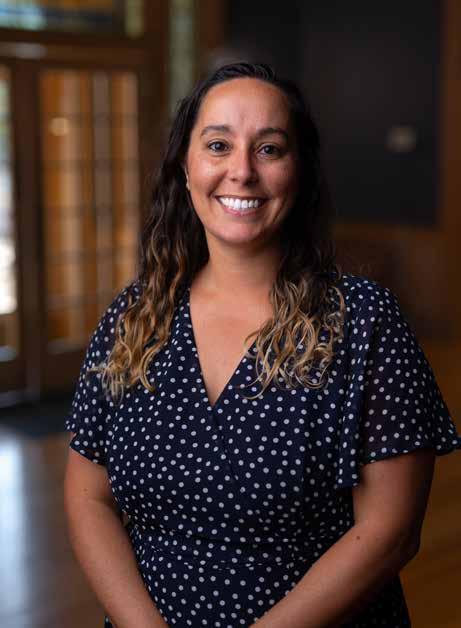
Photo by JOHN BURNS
Kansas Children’s Discovery
Kaitlin is the director of development for Kansas Children’s Discovery Center, where she oversees fundraising and development to support the museum’s mission of enriching the lives of children and communities.
She has previously worked as the development director for the Washburn University Alumni Association and Foundation. She is the former assistant dean of admissions at Washburn University School of Law, where she was recently bestowed the Graduate of the Last Decade award.
Kaitlin currently serves as vice president of the board of CASA of Shawnee County and as secretary of the board of Topeka Habitat for Humanity. She is involved with the Kansas Women Attorneys Association and volunteers with Kansas Legal Services and Topeka Alumnae of Delta Gamma.
What led you to your career?
All of my parents are college graduates, so it was a bit of an unspoken understanding that I, too, would attend college. While I wasn’t opposed and didn’t feel I was being forced, I didn’t exactly show up as a freshman with a clear sense of where I was headed. Connections to professors, mentors and longtime friends
turned family have developed and also contribute to informing the path. I find the endless pursuit of knowledge to be enjoyable and have come to appreciate the variety of ways in which we can raise and educate our children. Helping to create stability for a place that is such a source of fun, interactive learning and joy feels like a good use of the skill set I’ve developed.
What’s the most important part of your work?
Clearly conveying the vision and impact of the “Building Discovery” expansion project. Engaging with our community and demonstrating how contributions to the project will enhance educational opportunities for all children. Being able to inspire and mobilize support.
What’s the last series you binge-watched?
“Young Sheldon.” Our 10-year-old and I watched an episode together and were instantly hooked. We watched a couple episodes a day until we got through all seasons. We’re anxiously awaiting season seven!







What characteristics do you value most in your coworkers?
As a non-clinical person working in the health care field, I could write a book about this. However, one characteristic that has always stood out to me is healthcare workers’ constant capacity to care.
Photo by DANE STEPHENSON
Although providers see hundreds, if not thousands of patients each year, it has been incredibly refreshing to experience their care and consideration during the unfortunate times when I’ve had family members in the hospital. It often feels like these caregivers show up to work just to take care of my loved one.
Director of Health Equity and Policy
Stormont Vail Health
As the director of health equity and policy at Stormont Vail Health, Emersen bridges the gaps between patient care and community well-being. She strives to improve the accuracy of demographic data collection, understanding that behind every number, there are real people and real stories.
Emersen oversees many initiatives to foster inclusivity, empower underserved communities and enhance the quality of maternal and child health.
She is active with several community organizations, such as the Topeka Community Foundation, the Racial Equity Impact Analysis Group and Shades of Theatre.
What should one never take for granted?
The people who support you. It’s not always the ones you expect, but there will be people in your corner, cheering for you behind the scenes. Appreciate them and offer your support where you can.
What are you currently reading?
I love reading. Right now, I’m halfway through “Such a Fun Age” by Kiley Reid. It’s a coming-of-age novel that explores race, gender, socioeconomic and sociopolitical themes. I’m really enjoying it so far. I see many parallels between myself and the main character, Emira, in terms of our interests, dilemmas and life questions.
Owner and Dentist
Ziegler Family Dentistry
Pete is the owner and sole practicing dentist of Ziegler Family Dentistry. He provides routine and emergency dental care while educating patients on how to take their health into their own hands. Recently, he and his team have started a program to volunteer with different local organizations every month.
Since 2018, Pete has volunteered with Donated Dental Services and Kansas Mission of Mercy to provide free dental care to those in need. He is actively involved in the 20/30 Club, where he tracks and raises money for local organizations that directly benefit the children of Shawnee County.
Pete also supports many Catholic churches in Topeka. At his home parish of Sacred Heart-St. Joseph, he proudly sponsors their biggest fundraiser and gives several hours of time to help with the set-up and planning of the event.
What do you love most about your work?
Day to day, it’s working with my hands. The highlight of my days are when I completely change someone’s life with a new smile after years of hiding their teeth.
What should one never take for granted?
Time. As a working dad, it sometimes feels as if I rarely see my boys during

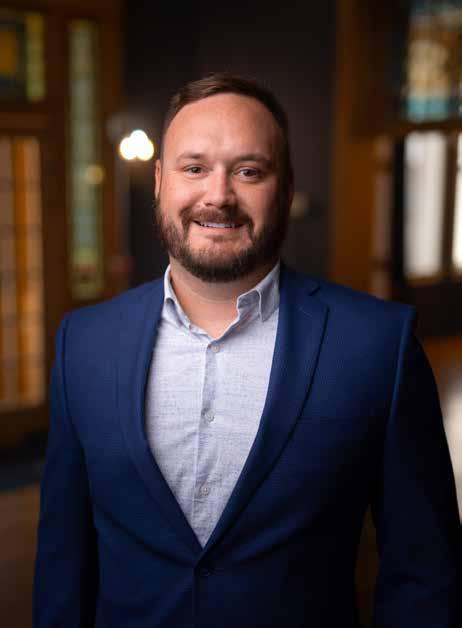
the week because by the time I get home we have about an hour before baths and bedtime routine get started. I am blessed to have Fridays off work to spend all day with them, but I still cannot believe how fast they are growing up, even in three-and-a-half years.
What do you collect?
Bourbon. My wife would tell you I need to stop buying it, but I would argue that you can never have too much. It is a collection at this point, and I love to have friends over to let them try different kinds.

Gabrielle Tanner is the principal of Sheldon Head Start Child Development Center and Pine Ridge Prep Preschool. She advocates for best practices within the Topeka education system and works to showcase not only the importance of public education, but also early childhood education and interventions.
Gabrielle is passionate about fostering a collaborative environment and mentoring the next generation of leaders in Topeka. She serves on the Whole Family Coalition and the Kansas Head Start Association Professional Development Committee, volunteers at Topeka Civic Theatre and Academy and is on the Briarwood Swim Club Board of Directors.
What’s the most important part of your work?
While I’m sure that my answer should be helping students to achieve academically, that’s not the most important part. I feel very strongly that the most important part of my work is ensuring that every student that walks into my building feels safe and loved. Giving them this most basic, solid foundation allows them to excel in every other area of education.
What is non-negotiable for you?
Honesty. This goes for my personal and professional life. Without honesty, there is no trust. Things happen and people make mistakes, but when we are honest about it, we can work through those things together and hopefully come out stronger for it in the end.
Who is your greatest inspiration?
My greatest inspiration is a colleague, Dr. Bridget Stegman. When I first began at TPS, we were instructional coaches together. Immediately, I was in awe of her knowledge, her positivity, her

drive, her work ethic and how she built trust and relationships with staff. A few years ago, Bridget was diagnosed with ALS. She has faced this like any challenge in her life and is not allowing it to define her. She is a shining example of handling the adversity life throws your way and using it as a springboard to fulfill goals and
dreams, and also to positively impact others. She campaigns to spread ALS awareness and fundraises for research toward a cure. I admire and strive to achieve her level of strength and resiliency, how she turns her challenges into an opportunity to have a wider, positive impact.






Photo by JOHN BURNS
Program Manager, Work for Success Mirror, Inc.
Kristen is the program manager for the Work for Success program at Mirror, Inc.
Since May 2023, she has been instrumental in developing partnerships with community resources, managing staff training and overseeing case management services. Her role also involves grant management, social media oversight and program growth.
She actively contributes to the Shawnee County Reentry Council and the Community Action Against Human Trafficking Rotary Club, and is involved with Communities Organizing to Promote Equity and Topeka Rescue Mission.
Kristen also works with Intersection to Care, a mentorship program for incarcerated women, and runs her own podcast called Reentry Reframed. She has been named a NextGen Under 30 Kansas Honoree and a Paul Harris Fellow.
What’s the biggest professional goal you’ve accomplished?
Creating the Reentry Reframed podcast, which highlights the journeys of people returning to the community after incarceration. Our mission is to reframe the perception of reentry while offering hope to those navigating this
process. We raise awareness about the challenges justiceinvolved individuals face and bring together like-minded individuals to collaboratively develop solutions. I’ve also had the opportunity to help develop Intersection to Care, a mentorship program for women incarcerated in Shawnee County Jail.
What is something you wish someone had told you during your career journey?
I’ve been fortunate to have amazing mentors who taught me the value of having “courageous conversations.” I’ve also had the support to take risks and pursue my goals and dreams. One thing I wish I had been told — and that I now tell others — is this: Your dreams are possible. Writing them down brings them into reality, giving them physical form. Creating a plan and working toward it is what brings them to fruition.
What would we mostly likely see you doing on the weekend?
You would either catch me outside in nature exploring some trails, or indulging in our local art and music scene in NOTO!





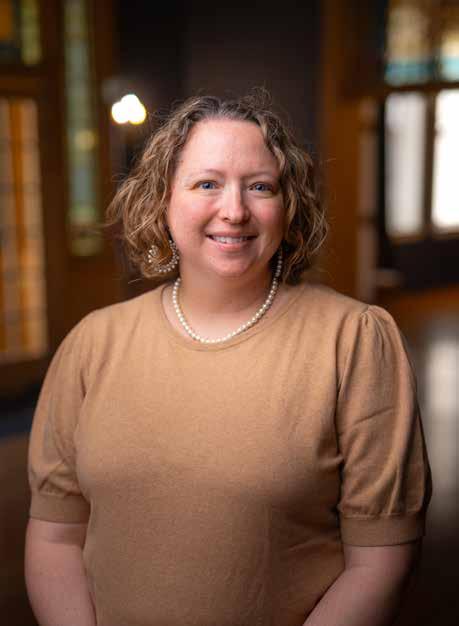
What’s the most important part of your work?
As a pastor at Fellowship Hi-Crest, I recognize that many people are searching for purpose or answers to life’s challenges. Often, this includes grappling with difficult questions about faith, God
and the role of the church. The most important part of my work is creating a trustworthy and safe environment where people feel comfortable asking these tough, deeply personal questions. It’s in these moments of honest exploration that true growth and healing can begin.
Director of Ministries Fellowship Hi-Crest
Jill is the director of ministries at Fellowship Hi-Crest, where she leads more than 75 volunteers and staff across multiple areas.
Since 2020, she has implemented transformative community initiatives that include the Summer Fireworks Extravaganza and the Teacher Resource Fair. She has been a pivotal part of COVID-19 relief efforts and earned the Shawnee County Public Health Champion Award in 2022.
Jill’s leadership roles include her work with Hi-Crest NIA, where she secured $1 million in grants for neighborhood improvements. She also serves on the boards of the Shawnee County Extension Agency and Housing and Credit Counseling Inc.
How have you evolved and grown during your career?
My career has been a journey of intentional growth, particularly in leadership development. Early on, I struggled with burnout — both for myself and the teams I led. Over time, I learned that sustainable leadership means not just assigning tasks but building teams where individuals thrive in their roles. This shift required me to take a hard look at my own flaws and make a daily commitment to becoming a better leader. By fostering an environment where people feel empowered and passionate about their work, I’ve been able to build stronger, more effective teams.
What do you do for fun?
I love learning new hobbies. There have been many over the years and I don’t tend to land on one for long. I taught myself how to crochet during COVID. I’ve learned to play pickleball, I’m taking some ceramics classes and I’m always up for a good experiment in the kitchen. I love learning new things because it fills my tank.

Pedro is the CEO of NOTO Arts and Entertainment District, where he has been central to the organization’s development and growth.
He also oversees the day-to-day management and operations of the Topeka restaurant Wheel Barrel, including its financial oversight, vendor management, quality control and strategic planning. In the past, he has created menus for The Pennant, Brew Bank and The Tee Box, all located in downtown Topeka.
Pedro has been a member of City Of Topeka’s Homeless Initiative Core Team, which works to end homelessness in Topeka by providing resources and support to those in need.
What led you to your career?
A deep belief in building something meaningful, not just for myself but for future generations. I genuinely believe that Topeka can support creative and innovative initiatives. While some may dismiss Topeka, my response has always been, “We haven’t tried yet.” As the CEO of NOTO, my goal is not only to foster a unique and diverse arts district but also to create a space that our city can take pride in. I believe Topeka is experiencing a renaissance where artists and entrepreneurs are beginning to believe and invest in themselves, and truly contribute to our city’s growth. It’s an exciting time and I’m proud to be a part of it.
What is one word you would use to describe yourself?
Resilient. Throughout my life and career, I’ve faced challenges, but I’ve always found a way to push through and turn setbacks into opportunities. Whether it’s overcoming personal hardships or leading a team through difficult times, I believe in staying strong, adapting and moving forward with purpose.

What musical artist do you never tire of?
Lindsey Stirling. The way she plays the violin is truly amazing, blending classical elements with a modern touch. But more than that, classical music as a whole is my favorite. It has a way of calming me down, and I believe that music doesn’t always need words to convey emotions. The tones, speed and depth of classical pieces can resonate with any mood — whether you’re happy, mad or sad. It’s universal, and that’s what makes it timeless for me. I could listen to it endlessly and never get tired of it.


What has been your biggest Aha! moment?
That as a person with differing abilities, my voice and opinions are valuable. I can help others to learn and understand how important it is to hear from people with all abilities.
Photo by JOHN BURNS
What is one word you would use to describe yourself?
Brave. The Special Olympics Oath is “Let me win, but if I cannot win, let me be brave in the attempt.” I work hard to be brave in new situations and in overcoming challenges.
Barista, Dialogue Coffee House
Athlete and Spokesperson, Special Olympics Kansas
As a barista, Bekah is known for her dedication and warm personality. As an athlete and spokesperson for Special Olympics Kansas, she is known as a role model and advocate for the program’s impact beyond sports.
Bekah has lobbied Congress in support of legislation to enhance the quality of life for Special Olympics athletes. Next year, she will represent the Special Olympics USA team in Italy.
She has participated in the Polar Plunge for Special Olympics and several fundraising events for law enforcement. Kansas University Basketball Coach Bill Self calls Bekah “Big XII Girl,” a reference to the Big XII Female Special Olympics Athlete of the Year she was awarded in 2013.
What would we mostly likely see you doing on the weekend?
Most of my weekends are spent either competing in sporting events or watching sporting events. Some of my favorites are swimming, bowling and snowshoeing, and anything KU is competing in. Rock Chalk!














What’s the biggest professional goal you’ve accomplished?
Ever since I was a child, I have always wanted to investigate crimes. This desire stayed with me, which led me to pursue a degree in criminal justice at Washburn University
and ultimately a career with the Kansas Bureau of Investigation. As I reflect on my journey, I am proud to say that my greatest professional accomplishment to date is attaining the rank of special agent and being assigned to the Child Victims Unit.
Kansas Bureau of Investigation
Randi is a special agent with the Kansas Bureau of Investigation. In addition to investigating criminal cases from initiation to conviction, she conducts crime scene photography, evidence collection, 3D laser scanning and diagramming.
She is a member of the bureau’s peer support team, providing resources to peers struggling with mental health challenges caused by work or personal events.
Randi took on leadership roles for several student organizations while attending Washburn University. She is an alum of the Zeta Tau Alpha sorority and currently serves as their new mentor advisor. Randi is also a member of the Washburn Young Alumni Council, working to engage recent Washburn graduates in various alumni activities.
What do you think is the secret to a good life?
The first is building a fun and loving circle of family and close friends to help you learn, grow and enjoy all aspects of life. The second is finding a career or hobby that you are passionate about, brings you great fulfillment and contributes to the greater good of society.
Who is your greatest inspiration?
My greatest inspiration is my husband, Brett. He is intelligent, kind and has an eye for seeing the good in people. His ability to work through any situation with a smile continues to impress me. He is the calm to my storm and my better half. Brett inspires me to be the best version of myself every day.

Executive Director Topeka Doula Project, Inc.
Abriona is the executive director of the Topeka Doula Project. She has made significant contributions to maternal and infant care for Topeka’s most vulnerable populations, and works to achieve health equity by advocating for breastfeeding and better hospital care.
Abriona hopes that her selection to Topeka’s Top 20 Under 40 will inspire others to follow her lead in maternal and infant care, while shedding light on the resources available to the Topeka community.
She serves on Stormont Vail Health’s Community Committee and the Racial Equity Impact Analysis Group, and is a member of the Delta Sigma Theta Sorority.
What led you to your career?
My journey started in lactation, which I learned about from a Black woman who breastfed. I was 18 and that was the first time anyone had said anything about it. When I began looking into why Black women were not breastfeeding, I learned that Black women are breastfeeding. The problem I did find was that Black women and their babies were dying. Black maternal mortality has always been an issue in the U.S., but I did not realize how big of an issue it is here in Kansas,

and how infant mortality among Black families is an even bigger issue in my county. I realized that it begins at pregnancy, so I became a doula.
What advice has served you well?
Rest. Because the things that need to get done will still get done.
What is one word you would use to describe yourself?
Kind. Because as Midwesterners, we are nice — that’s what we are taught. But genuine kindness is something I lead with because I do things with my heart, not just because I’m being nice.

Assistant Vice President and Trust Officer
BOK Financial
As a trust officer at BOK Financial, Joe provides legal and financial administration to over 135 trusts and estates for people in the Greater Topeka region. He advises individuals and families on estate planning, legal matters, money management, investments, taxes and retirement.
For more than twelve years, Joe has been a volunteer with the United Way of Kaw Valley and currently serves on its board of directors. He also serves on the board of directors for Child Care Aware of Eastern Kansas, where he is working to make Topeka a better place by ensuring access to quality child care.
Joe was instrumental in the development and growth of the Young Leaders Society, Junior Leader Reader and Born Learning Trail programs.
How have you evolved and grown during your career?
I have learned to focus on what I can control and not beat myself up about the things I cannot. Early in my career, I would sometimes attempt to take on every aspect of a project in an effort to make it perfect. I have found the best outcomes were realized when I concentrated on my responsibilities and trusted that my talented team members would do the same.
What is one word you would use to describe yourself?
Trustworthy. To be described as trustworthy means that you are faithful,

kind, empathetic, friendly, reliable, responsible, steadfast and truthful. In my professional and volunteer roles, I have been entrusted with leading people in our community down the right path into the future. I know that if I am given a responsibility, I will do everything I can to uphold it.
What musical artist do you never tire of?
I will never get tired of The Beatles. Thanks to my parents, I grew up listening to their music. Many of their songs take me back to an early memory or remind me of a happy time with family.








What’s the most valuable lesson you’ve learned?
That at the end of it all, life is about so much more than material possessions or achievements. It’s truly about the impact we have on those around us and the love we leave behind. Every interaction, every moment of kindness and every
connection we make shapes our legacy. Ultimately, it’s the relationships we nurture and the love we share that create a lasting impression on the world.
What motivates you?
My faith. It’s like my personal cheerleader, giving me
Brennan-Mathena Funeral Home
Marisol is the director of marketing and public relations at Brennan-Mathena Funeral Home, where she develops marketing strategies and provides compassionate funeral services.
Her commitment to community involvement includes work with the Kansas Emerging Leaders program, the Valeo Foundation Board and the Leadership Greater Topeka Advisory Board. She also volunteers for Big Brothers Big Sisters, Fiesta Topeka and the City of Topeka Human Relations Commission, advocating for youth, cultural events and inclusivity.
Marisol is part of the Kansas Emerging Leaders program, where she collaborates with peers to address state challenges. Her professional and personal goals include expanding her influence in the funeral industry and continuing her mentorship and community service efforts.
strength and purpose every day. My faith inspires me to serve others with a big dose of compassion and love, reminding me that I can make a difference in the world. It’s that little spark that fuels my passion for my work and keeps me excited about uplifting everyone around me. Plus, it adds a splash of joy and positivity to everything I do.
What is your most used emoji?
The smiley face. It’s a great way to express happiness and positivity, and I find myself using it to brighten up conversations and spread a little cheer. It’s like a little burst of sunshine in digital form!

Community Engagement Coordinator
YWCA Northeast Kansas
Kristin is the community engagement coordinator for the YWCA Northeast Kansas. Her desire to help others through empowerment led her to a career in social work, and continues to guide her as a spouse, parent, community member and nonprofit advocate. She hopes to increase the visibility of the YWCA and strengthen the organization’s stance as an advocate for survivors, families and women.
Kristin is a member of Topeka Voter Collaborative, the League of Women Voters of Topeka and Shawnee County and the Kansas Coalition Against Sexual and Domestic Violence. Kristin volunteers at Sacred Heart-St. Joseph Catholic Parish, Kansas Interfaith Action and Moms Demand Action.
What does a day in the life look like for you?
Every day is different! YWCA Northeast Kansas has so many programs, services and events throughout the year that I joke that we have “busy seasons” and “busier seasons.” I’m not at my desk much. You’re more likely to see me at the library for a meeting, stopping by a community event in the evening or tabling at a festival on a Saturday afternoon.

What characteristic do you most admire in others?
I admire women who move forward unapologetically, who don’t wait for permission to accomplish their goals and who do the work that needs to be done.
What makes you unique?
My style of social work. I’ve never been a traditional practitioner, but I view the broader work of community building through a social work lens. I see our challenges through a strengths-based and empowering framework.

Repairs Manager Topeka Habitat for Humanity
Josh is the repairs manager for Topeka Habitat for Humanity. He coordinates the organization’s Aging in Place program and spearheads several other revitalization and community education projects.
In his spare time, he teaches free home maintenance classes, in which community members can learn how to properly maintain their homes and become good neighbors.
Josh serves on the Topeka Center for Advanced Learning and Careers Advisory Board, the Shawnee County Advocacy Council on Aging and the Kansas Habitat for Humanity Construction Advisory Committee. He supports several community organizations, including the Boys and Girls Club of Topeka, the YWCA and Braided Haven.

What characteristics do you value most in your coworkers? Compassion and empathy.
What is one word you would use to describe yourself? Determined. I own who I am and what I bring to the table. I am firm in my beliefs and persevere through hardship to accomplish the task at hand.
What do you collect? Odd tools that other people have modified, because I anticipate the day I figure out what predicament they used those tools to find a solution for.













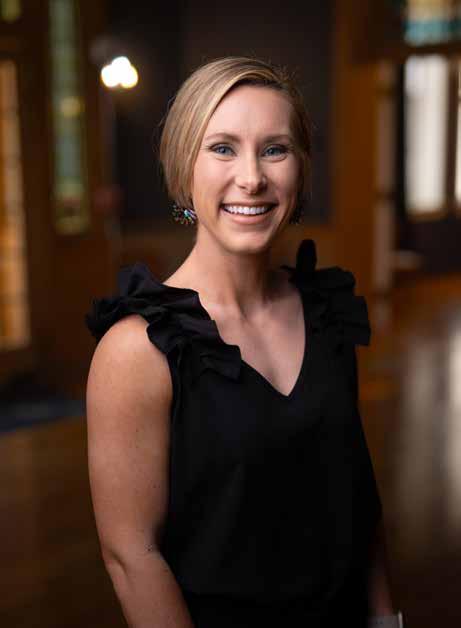
Photo by JOHN BURNS
New Parent and Medical Outreach Specialist Down Syndrome Innovations
Kayla is the new parent and medical outreach specialist for Down Syndrome Innovations. Upon moving to Topeka, she made it her goal to give back to the community and create the future her family envisioned for their daughter with Down syndrome. That meant embracing, supporting and creating spaces that are inclusive, accepting and understanding of all.
When she’s not wearing her advocate hat, she teaches gymnastics at Capital Gymnastics and Athletics. She has been coaching and teaching young children to be resilient, confident, caring and inclusive for nearly 12 years, and prides herself on making athletics accessible to any child.
What is non-negotiable for you?
What’s the biggest professional goal you’ve accomplished?
There are several national Down syndrome organizations and most of them host some kind of annual conference. Last year, a friend prodded me to submit a session proposal to one and I was
Photo by DANE STEPHENSON
accepted. I was able to speak to a room full of parents and self-advocates about how to establish and run a successful medical outreach program, and ended up being invited back to the same conference this year to lead the team of volunteers serving the policy and advocacy team.
I refuse to change myself for anyone or anything. I spent many of my early years dealing with bullies. I pursued theatre in high school and spent hundreds of hours quite literally practicing being someone else to escape who I was. As an adult woman, I have been blessed to be surrounded by some incredible role models who have helped me to accept and appreciate who I am, and to stand strong in my values, my goals and my self-worth.
If you could choose one superhuman ability, what would it be?
I would love to be able to teleport! A perk of being a military spouse and a pageant queen is that I have friends literally all over the globe, but travel is time-consuming and expensive! If I could teleport, I could visit any of them any time I wanted.

Owner
Topeka Auto Glass
Topeka Tint Company
Iron Man Productions
John began his career in Topeka as a project manager at Ernest-Spencer Metals and is the current owner of Topeka Glass Company, Topeka Tint Company and Iron Man Productions. He handles business development, marketing and sales for all of the companies.
John has considered Topeka his home ever since fellow community leaders took him in after he served time in prison. He now spends his time mentoring those who have experienced similar struggles.
He is an active member of the Topeka 20/30 Club, Sole Reason, Seminary of Urban Leadership and the Arrow Recovery Group. He’s also the current Heavyweight Boxing Champion of Kansas and Missouri.

What led you to your career?
I had just won a big boxing fight on Showtime when two of my friends started talking to me about an auto glass business they were starting. I asked if I could partner with them and used the purse that I made on my Showtime fight to buy into the business.
What advice has served you well?
When I was younger, my father told me that I would become like the people I surrounded myself with. He told me to look at my three closest friends and that based on what kind of people they were, I would know what kind of person I was. Make sure
you surround yourself with good people.
What do you think is the secret to a good life?
Understanding the true definition of contentment. Contentment is not about having the things you want. It’s about wanting the things you have.


What makes you unique?
I tend to challenge the status quo. I love to identify new and better ways of doing things. I don’t give up easily if my unique idea is rejected. I repackage it and have another go at it. It allows me to be persistent in the face of obstacles.
What do you love most about your work?
Every day is different. I see different patients every day, which means I get to interact with different people and their personalities. It allows me to meet a diverse, everchanging population of people
Acute Care Registered Nurse
Stormont Vail Health
Thaina is an acute care registered nurse at Stormont Vail Health, where she leads the surgical services team, chairs several committees and strives to improve safety and inclusivity.
Thaina is active with the American Society of PeriAnesthesia Nurses, MissouriKansas PeriAnesthesia Nurses Association and Kansas State Nurses Association. She is a past recipient of the Excellence in Nursing Practice Award and Rising Star Award.
Thaina mentors students at Washburn University and Baker University and is the founder of Nurses Topeka, a community group that supports healthcare workers. She promotes health equity, safety and diversity through her work on national legislative proposals for environmental gas exposures and her leadership in the Inclusion, Diversity, Equity and Accessibility (IDEA) Committee.
in my community, helping me grow as an individual.
What’s your leadership style?
Being transformational, as well as being a servant. I switch between them depending on what is needed in the moment. I like to focus on the growth of my coworkers, department and organization. My goal is to build long-term momentum and see the value in prioritizing employee development and engagement. By focusing on the growth and development of employees, it can create a positive workplace culture that inspires individuals to perform at their best.






What do you love most about your work?
I enjoy the different challenges my days can present to me. In the morning I’m a dad and husband. That’s my favorite time of day. Then I can be a cook, a server, a restaurateur, a venue owner, a mixologist,
a real estate investor and a consultant. This keeps me challenged and allows me to put my attention and focus into creation and problem solving. I’m known for being a bit “all over the place,” but that’s because it’s how I stay engaged and focused. I love that it allows me to get to
Owner
SKY
Torchlight
Crete Group
Trident Partnerships
The Beacon
Since 2016, Chris has become the current owner of five Topeka businesses: a full-service restaurant (SKY), a property management company (Torchlight), a consulting company (Crete Group), a historic renovation company (Trident Partnerships) and an event space (The Beacon).
He has provided housing for approximately 40 people, as well as assisted in the restoration of seven properties across the state, with another five to 10 planned over the next two years.
In his businesses, he manages everything from customer service and community networking to business planning, organization and strategy. Chris is also an active member of Topeka’s 20/30 Club.
know so many interesting and special people. I also love to create employment opportunities and engage people to help me execute my vision.
What is something you wish someone had told you during your career journey?
Be patient. I am good at seeing into the future and making and following a plan to get there. However, I’m often impatient about the time it takes to do so. I want to pick up the shovel and go do much of it myself, but that is not a strategy that will make me successful. I have to trust the process, and the people I’ve surrounded myself with, to execute the dreams and visions I have.
What characteristic do you most admire in others?
How hard most people really are trying. We often discount each other’s efforts. TK



By MICHAEL AUSTIN
Should the government be run like a business? The Topeka Capital-Journal recently highlighted several interesting findings from the local business community, which shed some light on the answer.
A survey of more than 100 Topeka business leaders shows that most are optimistic about their businesses: they plan to hire more workers, invest in capital and grow sales. However, they are far less hopeful about the broader local, state and national economies, citing inflation, stagnant development and rising interest rates as hurdles. These findings aren’t unique to Topeka. The 2024 Nationwide Insurance Economic Impacts Survey found that 72% of small business owners nationwide rate the overall economy as “poor” or “fair,” yet still view their prospects favorably.
So, why the dissonance? Why do metrics arguably in the control of entrepreneurs seem to be improving, while metrics more conceivably influenced by government policy are trending in the wrong direction?
This entrepreneurial sentiment may reflect a fundamental difference between small businesses and government operations. Topeka businesses thrive because they operate with efficiency and accountability. Meanwhile, inflation, high interest rates and depressed development persist because, by and large, the government doesn’t follow the same principles.
Economist Milton Friedman explained it best: In the private sector, businesses that fail to innovate or satisfy customers go out of business. Entrepreneurs face constant pressure to deliver value, whereas government entities are insulated from failure. If a government program underperforms, it often gets more funding, not less. Governments lack a feedback mechanism like the price system, which continuously signals value and forces businesses to adapt or die.

Just as a thermostat keeps your home from getting too hot or too cold, a spending limit adjusts government growth based on key economic indicators like inflation, population growth and private sector economic activity.

In business, prices reflect customer satisfaction and efficiency. Consumers would never pay $1,000 for ramen noodles or $20 for a car. Private markets set prices based on supply and demand, constantly adapting to what consumers want and businesses can afford. Government programs, however, are funded by tax revenues, which everyone must pay, and are judged by elections rather than direct feedback on efficiency or performance.
Consider this: Government spending has consistently outpaced population growth and inflation over the past few decades. Between 1970 and 2020, the Congressional Budget Office reports that federal spending grew by over 9% annually, compared to population growth (1.6%) and inflation (3.8%). Meanwhile, a 2024 United States Department of Commerce report states that private sector GDP growth — the engine of wealth creation — lagged behind government expansion. In other words, government policy led to price hikes because too many dollars were injected into the economy at a faster rate than the production of goods and services.
Inflation isn’t just a number in a report — it’s a real challenge for entrepreneurs managing operational costs and wages. Government spending policies, left unrestrained, can make borrowing more expensive and reduce the available capital for business investment. Every business owner knows how thin margins can get when costs rise uncontrollably. Imagine that same pressure amplified across all industries in an entire state or nation. The more resources the government consumes, whether through taxes
or borrowing, the fewer that are left for businesses to innovate, expand and hire.
It’s no wonder why small businesses have such a pessimistic view of the economy. To fix this, governments cannot rely on price signals like the private sector. However, they can adopt a golden rule of fiscal policy: the private sector must grow faster than government spending.
To do that, the government needs a spending limit. It should not be a blunt or arbitrary limit that threatens the quality of government services, but it should be based on the understanding that the role of the private sector is to generate wealth, and that the public sector should allocate that wealth as necessary.
Think of it like a smart thermostat for the economy. Just as a thermostat keeps your home from getting too hot or too cold, a spending limit adjusts government growth based on key economic indicators like inflation, population growth and private sector economic activity. This ensures the government footprint remains manageable and doesn’t bite the private sector hand that feeds it.
In Kansas, this approach could have helped avoid the 2017 tax hikes that resulted from an imbalance of revenues and spending. A 2024 report by the Kansas Policy Institute shows that over the past decade, Kansas spending grew by an average of 6.3% annually, outpacing inflation, population growth and the expansion of Kansas’s private industries. Meanwhile, Kansas businesses and families are

1 2

The government should cap spending based on private industry growth, population growth or similar metrics.
In deficit years, government spending growth slows. In surplus years, it rebounds, following businesses over economic cycles.
shouldering thousands of dollars in extra costs due to inflation, and rising taxes are pushing residents to lower-tax states.
If Kansas had implemented a spending limit, the state could have maintained a more businessfriendly environment. This would lead to consistent budget surpluses, allowing Kansas to reduce or eliminate state income taxes. A lower tax burden would attract new businesses, encourage in-migration and create a more affordable, dynamic environment for living and doing business. Other countries have tried spending limit measures with varying degrees of success. Switzerland ties its spending to “potential GDP,” which has helped control the national debt since 2003, and surveys show high public satisfaction with this system1. Chile also adopted a voluntary spending limit from 2000 to 2011, where even the policy announcement improved the country’s credit rating2. From 2001 to 2005, economic volatility in Chile declined significantly3.
In the U.S., this approach is catching on. Colorado’s Taxpayer’s Bill of Rights (TABOR) restricts state revenues to an aggregation of population growth and inflation, requiring voter consent to exceed that limit. Texas and Utah have also tied government spending to population growth and inflation. A literature review on municipalities shows that one in every eight cities has a self-imposed spending limit. Moreover, the review found that cities with spending limits experience slower revenue growth without significant negative impacts on welfare outcomes4.
In Topeka and across the nation, while small businesses are leading the way with innovation and growth, the government’s inability to follow similar principles undermines the economic environment. Entrepreneurs know how to run a business efficiently and, by working with customers, they find solutions that benefit everyone. It’s time for governments to follow their lead. TK
1 Grier, A. (2011). The Debt Brake - The Swiss Fiscal Rule at the Federal Level. Federal Finance Administration, 32.
2 Fort, G. L. (2006). Structural Fiscal Policies to Target in the Chilean Experience. Latin American Debt Management Specialists, 69.
3 Frankel, J. A. (2011). A Solution to Fiscal Procyclicality: The Structural Budget Institutions Pioneered by Chile. National Bureau of Economic Research.
4 Brooks, L., Halberstam, Y., & Philips, J. (2012). Spending Within Limits: Evidence from Municipal Fiscal Restraints. National Tax Journal, 67.



By LISA LOEWEN
Photos by DANE STEPHENSON
Local entrepreneur Josh Gorrell used the experience he gained from a college side gig to build a thriving audiovisual, security system and smart home installation business — one that’s handled more than 20,000 projects across Topeka, Kansas City and Manhattan.
“When I was 15, my dream was to work at a car audio shop,” Josh said. “Loud car stereos, lots of bass, neon lights, you name it. I started out sweeping the floors and after a couple of years I became a stereo installer, then moved into sales when I got tired of having my head under a dashboard. I worked there for nine years while learning a lot about electronics and audiovisual technology and getting my business degree at Washburn.”
After a local home theater store closed, he realized that Topeka still had a business demand for at-home audiovisual installation services.
“Everyone owns technology they could use some help with,” Josh said. “That’s where we come in. Instead of Do It Yourself (DIY), we Do It For You (DIFY).”
As their name clearly suggests, Electronic Life is dedicated to better living through electronics. The business specializes in the design and installation of both commercial and residential home theaters, automation systems and security systems.
Formerly known as Kansas Audio Video, the company changed their name to Electronic Life in 2015.
Josh said there were several reasons behind the company’s decision to rebrand. First, they’d expanded their services to include security system installations upon acquiring local security businesses Security Central, Home Connections and HCKC between 2007 and 2015.
Second, they needed a way to better market themselves across state lines. “We quickly found out that if your name is Kansas Audio Video and you’re working in Missouri, nobody wants to work with you,” Josh said.
The third and final reason was that Josh had been holding on to www.electroniclife.com for years, believing that someday the domain would prove useful — which it did.
After the rebrand, Electronic Life nudged its way into the Kansas
City market. They seized another opportunity for growth after acquiring local firm D&D Security in 2021.
“We still have the original D&D Security team on board,” Josh said. “That’s the key to a successful acquisition. We value their expertise and relationships because they make us better.”
Last May, the company expanded farther west when they bought The Wiring Guy, another local business that had been offering similar products and services in Manhattan for more than two decades. They kept the entire original staff, just as they did with D&D Security.
“I learned early on that you can’t just acquire a business and go in with a blow torch and make changes,” Josh said. “You
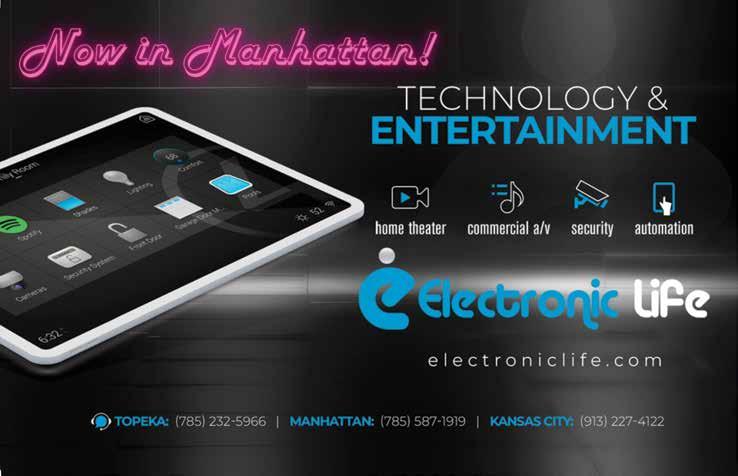
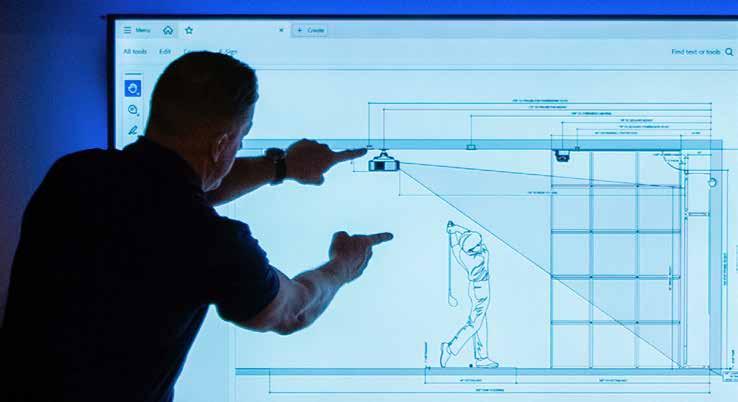
either because of the expense or the learning curve involved, Electronic Life offers a happy medium.
get better results when you conduct the transition gently.”
Today, Electronic Life does 90% of its business in Northeast Kansas and Missouri. Half of their jobs are residential.
“Residential work can be as simple as installing a TV, or as complex as setting up a fully automated smart home,” Josh said.
The “smart home” trend has seen significant growth in recent years. Through a single app or the touch of a button, smart homes allow people to remotely control their home’s thermostat, lighting, televisions, stereo equipment, appliances, garage doors and more.
For those who don’t want their entire house to be on a smart system,
“Most people just want a nice app on their phone that they can use to run their security, cameras, thermostat and maybe their music in a handful of rooms,” Josh said. “You can do that for a really reasonable cost.”
The demand for newer, better security solutions has skyrocketed over the years. What was once limited to door and window monitoring has grown to include integrated camera systems that are sophisticated enough to distinguish between humans, animals and cars.
The cameras can even be programmed to identify specific objects or events at different times of day. For example, a business might not want to be notified about cars in their parking lot that come and go during daytime hours, but overnight, that activity might be cause for concern.
“The demand for these systems probably doubles every few years,” Josh said. “Once something becomes more
mainstream, everyone wants it. And once somebody has it, if they move to another location, they will get it again.”
Josh added that the popularization of apps to control at-home lighting has been another boon for their company.
“People are going crazy for lighting control,” he said. “We have some houses where one press of a button can turn on 125 individual lights at specific times and levels. It’s amazing what you can control with an app and the right system.”
Josh described the lighting setup in his own home as an example.
At dusk, lights inside and outside his home dim in response to the change in light. When he goes to bed, he taps a “good night” button on his app to turn off everything in the house except the path lights down the main hallways. The system not only turns off television sets and lights,




Electronic Life’s many services include the installation of in-home golf simulators, which allow golfers to play hundreds of professional courses right from the comfort of their home.
but also ensures the garage doors are closed, all doors are locked and the security system is activated.
In the morning, Josh presses a “good morning” button to disarm the security system and increase the lighting in all bathrooms, closets, hallways and the kitchen.
He said he even has a “Frank” button that adjusts the lights — and turns on a Frank Sinatra music channel in predefined areas — to create a beautiful, ambient cocktailhour experience.
“We now have systems that let us update any home, no matter how old it is, by retrofitting the light switches without replacing the wiring,” Josh said. “They can control their home’s lighting on a schedule, all right from their phones.”
If there’s one thing that makes Josh smile from ear to ear, it’s the availability of in-home golf simulators, another product that Electronic Life has made available.
“Technology is frustrating at times, but fun. We get to play with other people’s toys all day,” he said. “And what’s more fun than playing golf inside?”
To install a golf simulator, the company brings in padded ceiling and walls, a projector with multiple screens and audio, touchscreen controls and other bells and whistles
for who want to practice their golf swing from the comfort of home. But they’re not a one-size-fits-all product, Josh said.
“We start by discussing budget and design parameters with the client,” he said. “Our designer then works with them to create a system that combines functionality and aesthetic appeal so that the space looks amazing.”
As he looks to the future, Josh plans to keep acquiring respected companies that already have quality services and good customer relationships in place.
“Our process gets better and better,” Josh said. “We approach buying a business as a partnership that makes sense for both companies. We take over the risk and they get to keep doing what they love.” TK











Since purchasing the property in 2016, long time North Topeka resident and business owner Adam Moser has been transforming this spacious rental venue with a fun mix of classic, retro and rustic touches.
Adam also owns Moser Tree Service & Sawmill, LLC, and your guests will marvel at the beautiful wooden details handcrafted by Adam himself. Former members and guests of Moose Lodge 555 will recognize some of the more iconic features, such as the neon sign in the Moose Ballroom, and the diamond patterned walls in Studio 555.
The Woodshed is truly one of the largest and most versatile venues around, and they are confident that you will feel right at home as you host your next event with us!
www.thewoodshedtopeka.com 785-213-3561



Former A Hann Thai owners, Juk and Apple, have partnered with KC and Chira Piyassaphan, longtime restaurateurs who were the original owners of Tuptim Thai in Topeka and Thai Diner in Lawrence to bring a new dining experience.
Located at 2222 SW Washburn Ave. (just off of 21st Street), Thai Table has a fresh look and an exciting new menu. You’ll find many of your old favorites, plus some new, special dishes inspired by when the owners were growing up in Thailand.
Whether you choose to dine in or takeout, the new owners hope you’ll enjoy their authentic Thai cuisine, always freshly made with love.
Open: Tuesdays-Fridays: 11 am - 2:30 pm & 5 pm - 9 pm Saturdays: noon - 9 pm
You can conveniently order online or call us for takeout.
www.thaitabletopeka.com 785-435-8555



The Refinery Medical Aesthetics specializes in nonsurgical and antiaging cosmetic services including Botox injections to smooth fine lines and wrinkles, dermal fillers for volume replacement, chemical peels, and SkinPen microneedling to treat fine lines, hyperpigmentation, sun spots, and scarring.
The goal is to enhance your natural appearance without the look of being overdone or unnatural. The Refinery team will assess your individual skin care needs and develop a customized treatment plan aimed at achieving your specific aesthetic goals.
Book an appointment and let The Refinery help you feel confident and beautiful in your own skin.
Sarah Jepson, Medical Director Board Certified Nurse Practitioner
Robyn Gorrell, Registered Nurse
www.therefinerymed.com 785-329-3499






By INDIA YARBOROUGH, SAMANTHA MARSHALL and LAUREN JURGENSEN
Photos by BRIAN PETERS
Six local organizations are investing in innovative changes that will enrich how Topekans live, learn and play.
Some are working to resurrect the vibrancy of the downtown core. Others are championing progressive education, while the rest are fielding exciting new options for recreation and entertainment. Together, they’re writing the thrilling next chapter of Topeka’s story.



When Seth Wagoner received a fateful call from his former Washburn University roommate Cody Foster in 2014, he didn’t expect to take over a business.
Ten years later, he’s the CEO of business development firm AIM Strategies, which owns and operates local favorites like Iron Rail Brewing, The Pennant, Cyrus Hotel and The Weather Room.
“Topeka invested in us, so it’s our time to invest back in Topeka,”
he said, reflecting on the company’s harmonious relationship with the community.
Seth estimates that AIM has invested more than $50 million into Topeka’s downtown core over the last decade. This includes its latest venture, a Mexican restaurant named Ta Co.
Cody, the owner and founder of AIM, said he brought on Seth because he wanted to work with someone he trusted. He also needed a business
partner with the right strengths to complement his own.
“My strengths involve the idea, the vision, the launch,” Cody said, explaining how Seth was the best person to manage operations.
Around the time Cody was planning to launch AIM, Advisors Excel — a Topeka-based financial marketing company that Cody coowns with David Callanan — was taking off. The success of Advisors Excel made it possible for him to invest his resources into new ideas.
“I called Seth one day,” Cody said, “and just said, ‘Hey, I’ve already made a few investments that I’m not sure are going to work out. I need someone to spend more time watching over and managing those, but I also have

some ideas about other things I think we could do.’”
Cody had acquired a few buildings downtown but still wasn’t sure what to do with them. Together with Seth, they made the decision to expand AIM’s team and manage projects directly.
While Ta Co. is the latest downtown investment in their portfolio, it’s unlikely to be their last.
“Ta Co. actually derived from a food truck,” Seth said. “We had a kitchen manager over in Lawrence that ran a food truck. He basically put this menu together, and we decided to conceptualize it into a restaurant.”
He added that bringing Ta Co. to the capital city was a “no-brainer.”
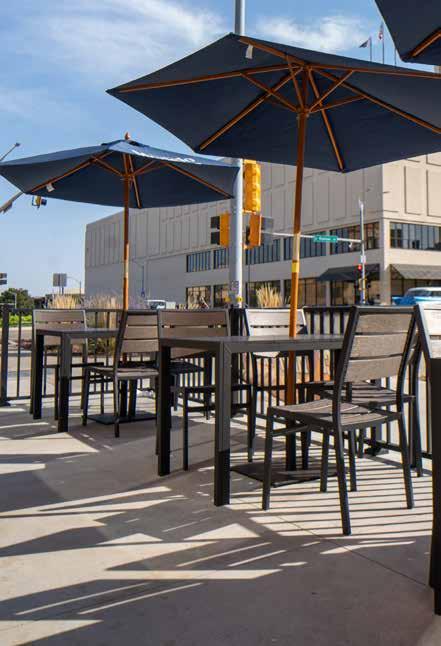
“We had a restaurant that approached us to buy out our lease in Lawrence,” Seth said, explaining how the buy-out became an opportunity to move their restaurant concept to Topeka.
The tacos-and-tequila joint moved in at the intersection of 8th Street and Kansas Avenue, where it now occupies three stories, each with a different vibe and covered patio seating overlooking the city.
Business has been solid so far, Seth said. With the addition of Ta Co., more than 90% of AIM’s staff is located downtown — and there’s a reason for that.
“Every great, thriving city I go to has a good downtown,” Seth said. “For 30 years while I was growing up here,
people said downtown would never be anything. Proving people wrong is something that Cody enjoys, I think. It’s been good to see Topeka embrace downtown. We just want to continue to see it grow.”
According to Cody, strategic community investment leads to further investment, and he’s happy to see more locals jumping in to keep the momentum alive.
New downtown housing options, such as apartments and lofts, might be the next business development Topeka sees from AIM.
“Cody is never out of ideas,” Seth said. “More than anything, he just cares about Topeka. I do think there’s still a lot of great things ahead for AIM — and for Topeka, as well.”
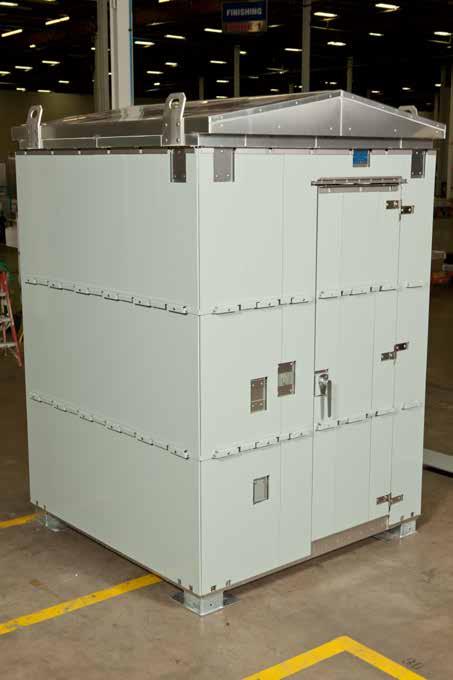
With business booming, it’s no wonder PTMW Inc. is ready and eager to add 182 new jobs.
Topeka-based PTMW was founded more than 40 years ago to support the rail industry. The company announced plans to expand their manufacturing footprint and job roster during the Topeka/Shawnee County Joint Economic Development Organization (JEDO) meeting in September of this year.
According to Ken Rankin, senior vice president of engineering and project management, the local manufacturing company’s growth is directly tied to developing and emerging industries. PTMW’s various product lines service rail and transit sectors, power companies, bigname technology businesses and beyond.
The company, which supports not only the rail and transit sectors but also power companies and big-name tech businesses, is best known for manufacturing high-quality enclosures. These dynamic, specialized structures are designed to protect everything from energy storage and data centers to mining and petrochemical equipment.
That might explain why the current data center boom became one of the biggest drivers behind their recent growth.
“Data center growth in 2023 was about $196 billion,” Ken said. “They’re expecting that to go up to $800 billion by 2030.”
“Rail is still core to what we do, but the growth is really in those other areas we serve,” added Morgan Padgett, senior vice president of finance and IT.
In theory, PTMW could operate its business from anywhere in the country, especially given the number of data centers popping up along the coasts. But it’s not by accident that they’ve chosen to remain in Topeka.
“The Bettis family are our current owners, and they’re from Topeka,” Morgan said. “They have a passion for supporting the local market and keeping businesses here.”
The city’s central location within the continental United States doesn’t hurt, either.



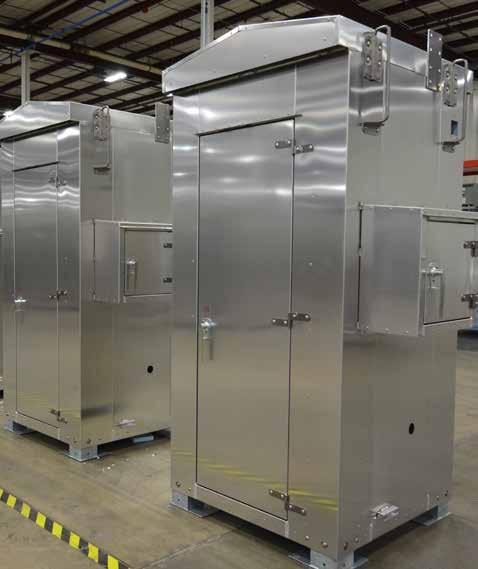
It’s not just data centers that buy from PTMW. Other customers include the rail and transit, mining and petrochemical equipment industries.
“We’re right in the middle of the states, and that really helps,” Ken said, adding that he also touts “Midwest work ethic” and their employees as reasons to stay.
The business, which already employs around 375 people, has plans to reach nearly 550 employees over the next five years. JEDO and GO Topeka have funded a $47.2 million capital investment that PTMW will use to drive business and expand the size of its campus.
According to Ashley Bettis, the president of PTMW, the company’s mindset is rooted in being run by a team of good people with good core values.
“There are good people that live around here,” Ashley said. “If we can provide a livelihood and help support each other’s families, that means a lot to me. It goes a long way.”
Ashley also said that she sees PTMW’s local investment as one that will bring new construction, new opportunities and new faces to Shawnee County.
“I was born and raised in Topeka,” she said. “It’s been a wonderful place for me to grow up. My family’s here. I’m raising two young boys here in Topeka. It’s home.”
Ken encourages people to not underestimate the company’s leadership.
“I think the biggest thing is the Bettis family’s commitment. They’re all in for this,” he said. “They don’t flinch when they know it’s the right thing to do and a good business decision that helps grow the company and the community.”
Nearly 6,000 open jobs are currently unfilled in Shawnee County.
Lack of quality child care is a major barrier.

Family Forward is addressing the child care shortage by bringing businesses, families and child care providers together:
• to create hundreds of new child care slots
• to build a business culture that is family-friendly
• to build a parent assistance fund You have a role. Let’s move forward together.

Topeka Collegiate was founded in 1982 to offer high-quality education in small classrooms to children from preschool to eighth grade.
At a school that values resourcefulness, it makes sense that the same students who attended middle school classrooms in trailers went on to join a group that produced 25% of the state’s National Merit finalists. That extraordinary drive to learn is what makes Topeka Collegiate students special.
Topeka Collegiate is an accredited independent school for children in preschool through eighth grade that stands firmly on its tagline “Limitless. Learning. Potential.” But in the years leading up the largest expansion in the school’s 42-year history, certain limitations were becoming more apparent.
The school’s four trailers, creatively dubbed “learning cottages,” were used as middle school classrooms for more than 25 years. Not only that, but the school’s
roof and HVAC system were long overdue for an update.
“We decided it was time to bring the school up to par and provide a campus where everyone can learn, be safe and grow,” said Dr. Lyn Rantz, head of Topeka Collegiate.
The $7.3 million construction project concluded last April, bringing the campus a new building with music and art classes, collaborative spaces and four middle school classrooms. The original building underwent extensive renovation, including new windows, new roofing, a new HVAC system, a storm shelter, a campus-wide security system and a modern, reimagined entryway.
“The way that you encounter the school is transformed,” said Bridget Elmer, vice president of the board of trustees, who is also a Topeka Collegiate
graduate and the mother of two current students. “We had a lot of pride in our resourcefulness. But there is something really inspiring about increasing that sense of pride.”
One of the highlights of the renovation is the Center for Curiosity, Awe and Wonder, a central space that students and staff can use for group work, performances and presentations. The space is outfitted with flexible seating, marker boards, reading nooks, a loaning library, a gathering table and several booths for small conversations.
“It’s so multivariant in its potential uses,” Bridget said, describing what she observed while visiting the space to attend a student performance with a small choir. “That community feeling is so much more present.”
The state-of-the-art space has already welcomed prestigious speakers, including Nancy Perry, former president and CEO of the United Way of Topeka, and a children’s book author who talked about her writing and creative processes.
When they’re not hosting speakers and performances, the space will serve as a collaborative work hub that will be central to Topeka Collegiate’s curriculum.

Topeka Collegiate’s $7.3 million construction project funded new collaborative spaces, middle school classrooms and spaces for music and art.


“We believe that learning is a social construct,” Lyn said. “One of our values is that these students will grow up to be leaders. We believe that to become a strong leader, you have to be able to work with all types of people.”
Topeka Collegiate’s administrative body hopes the new facilities will boost enrollment.
It has served more than 3,000 students since it opened in 1982. Small class sizes remain sacred, the school said, but their middle school roster still has room to grow.
Prior to the renovation, it had been challenging to get families to see past the aging facilities.
“It was hard for people to get past that front door,” Bridget said. “I think
everyone realized we needed to think about that perception and how people understood our mission.”
Starting from the front door, new families will see the building in a new light, helping them understand why parents like Bridget and Lyn sent their own children to the school.
“It’s been a joy to watch my kids experience Topeka Collegiate,” said Bridget, who credits the teachers for helping her son thrive. “They were so excited to go back at the end of the summer.”
“When students are well known, well supported and encouraged to be themselves, teachers are able to best teach to them,” Lyn said. “My children were able to be seen, have fun and grow up in a caring environment. They didn’t get lost.”

Auburn-Washburn School District is improving education for Topeka’s children at every school level. The district is investing in everything from early childhood education to career and technical education (CTE) opportunities.

by BRADEN DIMICK
If there’s one word that sums up the Auburn-Washburn School District’s capital improvement project, it’s “more”: more childcare, more space and more innovation.
By the time the dust clears in 2026, the district will have more resources and offerings to better serve all of its learners, whether they’re toddling into a classroom for the first time or preparing to stride across the stage.
“On graduation night in any given year, we’ll have about 450 graduates,” said Dr. Scott McWilliams, superintendent of Auburn-Washburn Schools.
“We want each of them to be happy, confident and have quality choices to pursue.”
In fall 2019, Scott scheduled more than 30 meetings prior to the development of the district’s 2021–2026 strategic plan. Students, PTO committees, the Kansas State Department of Education, the Kansas Board of Regents, Washburn University, Washburn Tech and the Topeka Chamber of Commerce all made the calendar as Scott sought to listen to feedback on how the district, which serves about 6,000 students, could improve.
“All of those folks make up our school community,” Scott said. “The more feedback you collect from different stakeholder groups, the richer the end result will become.”
Based on the feedback Scott and his staff collected, AuburnWashburn Unified School District passed a $145 million bond election to fund a series of capital improvement projects in three areas: enhanced career and technical education (CTE) opportunities, the reconfiguration of K-12 based on an assessment of school capacity and the expansion of early childhood education.
As pieces of the project come to fruition, the promise of what the students will do inside the new spaces shines even brighter.
In mid-October, Washburn Rural High School students walked into the brand-new, 50,000-square-foot Career and Technical Education Center for the first time.
“Moms and dads made it clear that more technical education would be good for many students, and we agreed,” Scott said. “We now have a state-of-the-art space
where students can truly learn real world skills and applications.”
Students can now master skills in the center’s video production studio, agricultural lab and greenhouse, biosciences center, robotics classroom and engineering maker space. By completing one of the center’s programs, they can also earn a professional certificate.
The district selected its new programs by considering feedback from their stakeholders, including local businesses in need of more employees.
“We’re hoping to make connections with businesses in town so our high school kids, once they graduate, will want to stay and take many of these really good jobs right here in Topeka,” Scott said.
One of the biggest issues the school district faced was a lack of space.
“Each of our schools felt tight and were almost busting at the seams,” Scott said. “Teachers were not able to do problem-solving or team-building activities because there simply was not space.”
Washburn Rural Middle School currently has more than 1,000 students, making it the largest middle school in the state. Recognizing the need to reconfigure school capacity, the district planned the addition of a second middle school. Once construction is complete, each middle school will accommodate approximately 650 students.
Another big change underway is the transitioning of sixth graders into middle schools, which will ease capacity across the entire school system.
“Our elementary teachers feel that sixth grade is a little old to be in the elementary setting,” Scott said. “We think there’s a maturity level and some academic learning opportunities that are better had at the middle level.”
The new school, officially named Washburn Rural North Middle School, will open at the start of the 2025–2026 academic year. The school committee and board of education were involved in brainstorming everything from the school’s name to its mascot (a raven) and colors (light blue and black).
“We tried to be as open and collaborative as possible when including the community, parents, staff and students,” said Jessica Roberts, director of communications. “The feedback showed a desire to maintain connectivity to the high school and Washburn Rural Middle School.”

Washburn Rural High School recently unveiled a 50,000-square-foot Career and Technical Education Center where students can earn a professional certificate for learning real-world technical skills.



Even the district’s youngest learners had felt the need for expansion. Auburn-Washburn currently serves more than 200 three-and-four year-olds, but Scott said they’d had to turn away at least half of the kids in the district.
By 2028, all children will have a seat in a classroom. The district also plans to outfit every elementary school with a childcare center.
“We’re going to get all of those kids in, with the goal of making them school ready and having benefited from structured learning opportunities,” Scott said. “That’s phenomenal.”
In addition to the early education centers in the elementary school, Pauline Central Primary School has received its own six-room early childhood center. It is also undergoing building upgrades to address some of the needs of area families, including a food bank and a washer and dryer located in a new Parents as Teachers Community Room.
“We’re addressing needs we know can sometimes get in the way of families being able to spend quality time with their young kids,” Scott said.
Scott believes their investment will benefit the entire city by creating a great school district that attracts new families to the region. “It takes progressive, stellar school districts to be able to attract people to your community,” Scott said. “By having current facilities, state-ofthe-art programs and a reputation for taking good care of kids, it helps our business community get the type of employees they want.”



Evergy Plaza has become a place where Topekans can go for live music, family movie nights and high-stakes boxing matches.

Evergy Plaza may be one of Topeka’s newer destinations for music and entertainment, but this young venue has already secured a reputation as a trusted go-to spot for exciting community events.
When it opened in 2020 at the height of the COVID-19 pandemic, the Evergy Plaza team had no choice but to start small, hosting low-key events limited to small crowds and strict social distancing guidelines.
Dylan Tyler, the manager of Evergy Plaza, said the venue has since come a long way.
“In the beginning, we had a DJ on stage and 50 people would come. Now we’re doing full-on live concerts,” she said. “I always point out to people that ‘community connects.’ It’s kind of our mission. We try to intermingle as many people as we can in many different ways.”
Dylan said it took time to reach a place where they could host largescale events for even larger groups of
attendees. As of 2024, Evergy Plaza — located downtown at 630 S. Kansas Ave. — is hosting everything from intimate gatherings to concerts and festivals that attract as many as 5,000 attendees.
Among their most popular events was the recent “Fight Night,” when the plaza transformed into a boxing ring for an evening. Fighters like John “Iron Man” Cantrell, who hosted the event, faced off against veteran fighters and new faces in a bid to win American Boxing Organization and Kansas/ Missouri Heavyweight titles.
Then there are the rock ‘n’ roll concerts, often featuring local bands playing covers of hits from the 1980s and earlier — a genre that Dylan said she’s overheard people affectionately refer to as “Dad Rock.”
“People here love it,” she said, adding that the 40-to-60 age group has become one of the plaza’s most loyal demographics.
Despite its success, Evergy Plaza is still operating with a lean team of only two full-time staff members. Dylan and her colleague Josh Sturm handle
everything from event management and operations to sales and marketing. Together, they strive to add spectacular must-see events to the plaza’s calendar.
“It’s taken a little bit to try and figure out our identity,” he said, adding that some of their efforts include partnerships with several community-based and nonprofit groups.
They’ve also had to consider sustainability.
“We’d love to just say, ‘Hey everybody, just come whenever you want and do whatever you want.’ But that’s not how it works,” Dylan said.
Finding a balance between operating sustainably and taking risks on new opportunities remains an ongoing challenge, but Evergy Plaza’s plans for the future are anything but modest.
Perhaps the most ambitious project underway is the potential for a permanent ice skating rink to replace the temporary ice rink structure they’ve offered in the past. Dylan said it’s still in the planning stages, but hopes that building a skating rink will expand Evergy Plaza’s appeal with younger demographics in their teens, twenties and thirties.
“I would love to see more consistent programming,” Dylan said, when asked about what else she and Josh are planning. That includes bringing more major concerts and festivals to Topeka.
Special events like the recently debuted Mimosa Mile Matinee, which the Evergy Plaza website describes as a “morning of movies and brunch,” are likely to become an annual fixture. This year’s Mimosa Mile Matinee featured a screening of the film “Mamma Mia!” with crepes and mimosas served by vendors La Creperie Co. and Axe & Ale.
They also host a monthly family movie night called “Friday Flicks,” presented by Communication Federal Credit Union, on the second Friday of each month.
This October, the plaza hosted a free kickoff party and pilot meet-andgreet to celebrate the opening day of the Thunder Over the Heartland Air Show presented by CoreFirst Bank & Trust at Topeka Regional Airport’s Forbes Field.
“Doing a meet-and-greet may not be as conducive all the way out

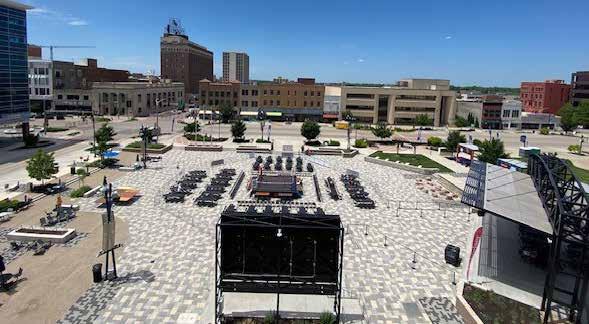
at Forbes,” Dylan said. “Being downtown, we’re right in the middle of Topeka where everybody from different angles can come and be in the middle.”
Dylan said Evergy Plaza’s local impact goes well beyond providing shows and entertainment.
“The value we bring to Topeka is seen in the connections and relationships we build,” she said. “We’re a centerpiece where people can connect. Not only can people see what other people are doing, but they



can actually meet other people to brainstorm ideas about what else the community needs,” she said.
She hopes that by creating a friendly space where locals can come together to discuss experiences and new ideas, the plaza will inspire Topeka’s residents to keep investing in arts and entertainment.
“Nobody should ever be where they want to be,” she said, when talking about the plaza’s goals for the future. “You always want to strive for better and better each year.”














Nienke Director



























At Family Park’s well-lit pickleball courts, players can practice their serve late into the night.

Family Park may sound like just another green space. But what makes Shawnee County’s first new park in 50 years so special are its modern amenities — including 16 lighted pickleball courts.
Sean Zears, the marketing and communication supervisor for Shawnee County Parks + Recreation, said the master plan for the park’s ambitious community-focused design had been in the works for almost five years.
“It was big,” Sean said when describing the original plan for Family Park, which opened in August 2023. “It’s been scaled down since then, but we’re fortunate to have the first phase done. We’re hoping to do a second and third phase down the road.”
Even after scaling back the design, the community has no complaints about the new park. Family Park’s location at S.W. 21st and Urish Road is nestled among neighborhoods that had previously lacked a proper green space. The new park was a welcome addition.
“I used to live around that area and there really wasn’t a place where you could just go and play,” Sean said. “I think the park fills a void. A lot of the playground equipment and other suggestions for the park came from people in the community.”
Unsurprisingly, the Topeka Pickleball Association — a 300-members-strong organization representing locals who love the
popular sport — is making use of the new courts.
“The pickleball courts are full all the time, and people are playing late at night,” Sean said.
Pickleball is just the beginning. Another crowning achievement at Family Park is the adaptive and inclusive playground designed for children of different ages and abilities.
“The adaptive community is so important to us,” Sean said. “We want to make sure everyone is able to enjoy the warm weather and go to a park. We don’t want to exclude anyone.”
A dedicated fitness loop for walking and jogging runs through the park. Meanwhile, plans are underway for an open-air shelter, which promises to be a gathering place for family reunions, birthday celebrations and other community events.
Sean was enthusiastic when he recalled the park’s opening day.
“The day it opened, the pickleball courts were completely full,” he said,




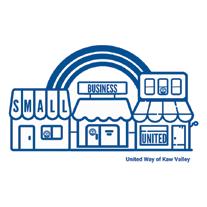


adding that their usage remains high. “We had 50 or more kids at our ribbon cutting.”
Sean credited the community’s embrace of Family Park to its thoughtful design, as well as the overall quality of Shawnee County’s parks.
“People enjoy the parks here in Shawnee County,” he said. “We are really proud of the work that we do here, and the upkeep goes a long way.”
The ultimate goal is to keep Topeka’s population happy, healthy and eager to remain.
“We want people to stay here,” Sean said. “I think the most important thing is that the dollars people spend stay in Shawnee County.”
Improving Topeka’s quality of life is essential for attracting and retaining residents. The ripple effect of keeping Topekans in Topeka is that it boosts local businesses and the overall economy of the city. By investing in parks that are modern and accessible, Shawnee County Parks + Recreation is elevating Topeka’s appeal.
“You can’t do that if you don’t offer really good facilities,” Sean said.
Sean said that Family Park, like all parks in Topeka, promotes mental health and community wellness.
“We want to make sure that people know that we’re here not only for the entertainment aspect, but for the mental health aspect, too,” he said.
Green spaces, he added, offer psychological benefits.
“Your mental health is so much better when you’re able to walk and listen to whatever you want to listen to, and just get that time to yourself,” Sean said, reflecting on the many walks he’s taken at Lake Shawnee, another local park.
Family Park’s walking trails and open spaces are a new opportunity for locals to relax and interact with neighbors. When families gather for picnics, friends meet for a friendly game of pickleball or neighbors cross paths on the walking trail, it improves the well-being of the community.
“Adding another park to an already fabulous system of parks and recreation programs, it just helps even more,” Sean said. “People see this park and decide they want to check out other parks, which leads to all of the parks being used more. I love that. We’re here for the long haul, and we’re here to help Shawnee County grow.” TK


By LISA LOEWEN
“Meridian” — a word for the lines of longitude that run north to south on maps — is not a term most people use every day. But the founders of Meridian Roofing Solutions chose it as their name after realizing it was the perfect way to sum up their business philosophy.
“Meridian lines are connecting points,” said co-owner Keith Richards, who founded the company with Nathan Morris in 2013. “We want our company to be a connecting point between custom roofing solutions and happy customers.”


Nathan grew up in the roofing industry and joined the family business when he turned 18, having never considered any other career. He eventually discovered that his work in the roofing industry was an opportunity to bring new ideas to life.
“From a young age I was fascinated by the construction of new buildings,” Nathan said. “The idea of creating something where there was once an empty space was mindblowing to me.”
Meanwhile, Keith had graduated from Kansas State University in 2005 and was working in marketing. Nathan and Keith were strangers until their wives, who taught at the same school, introduced them.
The two became fast friends. Soon after, Nathan brought on Keith to join the family business in a marketing capacity.
Nathan and Keith knew that when it came to work, they had something significant in common: both wanted to bring a more personalized touch to the industry.
“So many times, roofing solutions take a cookie-cutter approach that requires customers to settle rather than giving them exactly what they
want,” Nathan said. “We believed the Topeka market needed a roofing company that could offer custom work, and all types of roofing products instead of just one. Becoming experts in many different roofing materials allowed us to provide more solutions than what Topeka had before.”
Since neither of them were the final decisionmakers at Nathan’s family business, they knew they’d have to take a risk and start their own company if they wanted to achieve more.
For them, “achieving more” meant providing design and consultation services, as well as infrared scanning, inspections, repairs and custom architectural metal roofing. They now run their own sheet metal fabrication shop, where they can manufacture inhouse custom parts for any roofing job.
Meridian handles both custom and commercial roofing projects, but specializes in flat or “low slope” roofing. Low slope roofing is far more complicated.
“The Topeka market already had great step slope roofers, so it didn’t make sense to compete in that space,” Nathan said. “The market had a need, and we had the knowledge to meet that need.”
Over the past decade, they’ve completed projects throughout
Northeast Kansas that include government buildings, schools, hospitals and apartments.
The company’s biggest project to date has been the Stormont Vail Events Center, which was completed two years ago. Other notable jobs include the south tower of Stormont Vail Hospital, the new Kansas Turnpike Authority building in South Topeka, the Topeka Center for Advanced Learning and Career building and the new AshburnWashburn Middle School.
While they only market to customers within a 100-mile radius of Topeka, Meridian’s reputation often takes them farther afield to places like Hutchinson, where they’re about to begin their next undertaking.
Nathan and Keith said they’re proud of the reputation they’ve built with Meridian over the past 10 years, but won’t take all of the credit for the company’s success.
“Our team is amazing,” Keith said. “All of our employees have a problem-solving mindset, so we’re constantly working together to come up with solutions to complex problems.”
For Nathan, teamwork has always been the secret to bringing projects to life. “The older I became, the more I fell in love with leading teams of people to create,” he said.
That doesn’t mean everything always goes according to plan. Meridian had to adapt to the challenges of workplace shutdowns during COVID-19, and is still working through lingering supply chain shortages and a tight labor market.
“Growing a business can be a difficult but fun challenge,” Nathan said. “You have to design the roadmap, but you must also be willing to pivot.”










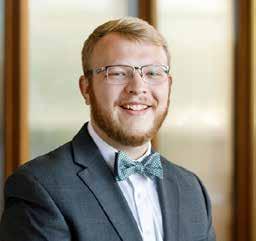


Meridian made one of the company’s biggest pivots in 2017 after buying the former Coca Cola building on Kansas Avenue. The original plan was to renovate the building and move their offices inside, but they soon realized it wasn’t going to work.
“Even though we couldn’t do exactly what we wanted with the building, we kept it as warehouse space and eventually turned it into what’s now our sheet metal shop,” Nathan said. “That’s how we survived the 2021 material shortage. At the time, the supply chain was backed up a year or more. We needed a place to store what we had until all the other materials for the project had shown up.”
Keith added that their other secret to survival has been fostering a company culture that rewards hard work, while seeing mistakes as golden opportunities to improve.
“People shouldn’t dread going to work,” Keith said. “We want our team to enjoy working here, not only because it’s a great career but because we also value their input. There is no
such thing as a bad idea. Sometimes the ‘worst’ ideas are the ones that get the creative process started.”
Keith and Nathan said it’s the reason why Meridian has minimal staffing turnover. Their crew superintendent, vice president of sales and project manager have each been with the company for eight to ten years.
Growing a successful roofing company takes more than hard work and a great product. The Meridian Solutions team said they wouldn’t be where they are today without the support of the community where they live and work.
The first job they landed happened after a chance meeting with one of their contacts at The Dugout Sports Bar and Grill.
“It was the south tower of the Stormont Vail hospital campus. The building had a concrete deck and they needed a way to install the roof without
drilling into concrete and disturbing patients,” Nathan said. “We proposed an idea to tear off the existing roof and glue down the new roofing products. It could be done with very little noise or interruption to the facility.”
“They loved it,” Keith said.
The business owners said they put the same care and attention into how they give back to the community.
In 2015, Meridian donated a roof to Habitat for Humanity. They perform yearly maintenance on the Ronald McDonald House, where Keith oversaw a new roof installation in 2019 and previously served on the board for four years. He also spent eight years on the board of Project Topeka.
Nathan founded the TEDxTopeka event series in 2014 and chaired the 20/30 Club of Topeka’s 2019 Gala.
“Our business is only as good as our reputation,” Keith said. “We hope people view us as more than just a company that does business with integrity. We want them to see us as a company that really cares about our community because we live here, too.” TK



Vicki Schmidt was elected Kansas insurance commissioner in 2018 and reelected in 2022. She is the first pharmacist to serve as commissioner and is one of only two pharmacists in America to hold a statewide office.
Vicki graduated from the University of Kansas School of Pharmacy and has worked for more than 40 years as a local pharmacist. Her professional experience drew her to run for the Kansas Senate, where she served for 14 years. She chaired the Public Health and Welfare Committee for six years and served as a member on the Financial Institutions and Insurance Committee for 12 years.
As commissioner, she has returned more than $35 million to Kansans policyholders. Her efforts to overhaul department operations have reduced the cost of doing business in Kansas, saving the insurance and securities industries more than $50 million. She currently represents Kansas at the National Association of Insurance Commissioners, where she serves as vice chair for the Midwest Zone.
Vicki and her high school sweetheart, Dr. Michael Schmidt, have been married for 50 years. The have two sons and are proud grandparents of four.
“At the Core with Danielle J. Martin” features leaders across Kansas and is dedicated to showcasing the stories and voices of local leaders who have substantially impacted their communities and industries.
Martin: Tell us about one of your favorite childhood memories.
Schmidt: I started dating my husband when I was 15 years old. When I was in fifth grade, I rode my bicycle through his baseball game. My neighborhood was all boys except for my sister and me. We used to torment them and ride our bicycles through there.
We went to college together and I never dated anyone else. We got

Scan the QR code to see the full interview with Kansas Insurance Commissioner Vicki Schmidt.

married when I was 18 and he was 19. Our 50th anniversary is coming up in just a few weeks. I’m fortunate we grew up together and have made a great life for ourselves.
Martin: Did you ever see yourself becoming the insurance commissioner of Kansas?
Schmidt: Never. This was a career change. I went to the University of Kansas and worked in the pharmacy world for many years. In the mid-1990s, Governor Graves appointed me to the Kansas Board of Pharmacy, which was a great opportunity.
At one point, I had to testify in support of a bill before the state legislature. When I was about halfway through speaking, I looked up and saw that two of the legislators had nodded off. I was so mad. I’d spent all this time preparing and this was really important to us. They couldn’t even stay awake to listen to what I had to say. I came home and told my husband what happened, and that it made me want to run for office someday.
Years later, when our youngest son was a senior in high school and about to leave for college, there was an opening in the state senate. I told my husband we’re about to become empty nesters and this is the time for me to do it. He said, “Well, I know a lot of empty nesters and they don’t lose their mind and run for public office.”
I went on to serve in the Kansas senate for 14 years and enjoyed my time there. When a seat opened for the Kansas Insurance Department, I took it. This has become more than a full-time job for me. I love it because I’m still helping people. I became a pharmacist and senator to help people. Being the insurance
commissioner is just helping people on a larger scale.
Martin: How do you stay motivated and show up every day confidently?
Schmidt: “Confidently” may be the key word. I think running for public office is tough. You’re really putting yourself out there. A real eye-opener for me was when I was serving in the Kansas senate and I got a phone call from a gentleman who said he didn’t vote for me but needed my help. I told him, “You’re in luck, because I don’t represent just the people who voted for me. I represent the entire district. What can I do to help?”
His situation needed immediate action, and I was able to help. I’m very proud to say it had a good outcome for him and his family. By the time it was over, he’d asked if he could put up a yard sign for me. Things like that are what keep me going.
Martin: How do you face challenging scenarios?
Schmidt: It starts with communication. If we don’t have good communication, then we don’t have good conversations and get to know the issues. I’ve found that sometimes we’re talking about the same subject, but we’re not speaking the same language.
Martin: What are some pressing issues Kansans might be unaware of when it comes to insurance?
Schmidt: The number one thing I preach is to have active conversations with your insurance agent at least once a year. When the tornadoes hit in Westmoreland and Andover, we found there was a segment of the population who were underinsured. They might have
replacement coverage, but they didn’t have it for the right amount. Make sure you know how much insurance coverage you have.
The other issue is affordability. I don’t set the rates, but I do approve the rates.
Martin: I want to talk a little more about you. You’re a breast cancer survivor.
Schmidt: That’s an interesting story. Apps like MyChart notify you before your doctor calls. When I found out I had cancer, it was the Friday before Memorial Day weekend at four o’clock in the afternoon. This was in 2023. I clicked on MyChart and saw that I had cancer. The world stopped. I’ll never forget how I could hardly breathe, but I did drive myself home. I sometimes wonder how, but I did, and I got back into that cocoon of somebody who loves me and is going to take care of me.
I had surgery and finished my radiation in September. I’m here to tell anyone who will listen: get your annual mammogram. Mine was a very small lesion and it was treated. Today, I’ve got a clean bill of health. I’m so thankful for the people who cared for me. I’m really thankful for my husband, who drove me to appointments and was my compliance officer. He wouldn’t let me do all the things I wanted to do when I wanted to do them.
Preventative medicine is better than having an emergency. Get your mammogram. I know they’re not the most pleasant thing to experience, but they can save your life. Pretty sure it saved mine.
Martin: When you were sharing your story, you made it sound like you can’t sit down.


Schmidt: I can’t. I wish I could tell you that I like to knit or crochet or do something with my hands, although I do like to go for walks.
The day after my surgery, I told my husband, “Hey, I feel good. I’m going to get dressed and you’re going to drive me to work.” He looked at me and said, “Turn around and go back in the bedroom. This is the medication talking right now.”
He was right. Don’t ever tell him that, but he was right. I think he hid the power cord to my work laptop from me. It’s really hard for me to step away. I didn’t think the office could work without me, but that’s not true. I have a terrific team.
Martin: What’s been the powerhouse moment of your career?
Schmidt: When I was a senator, I was proud to sponsor legislation
like the Clean Indoor Air Act. It’s so old now that people can’t remember when smoking was allowed in restaurants or grocery stores. That was a really big deal for Kansas to pass. We’ve provided autism coverage for children, and I also helped provide the seed money for the Kansas University Cancer Center while they were trying to get their NCI designation.
As commissioner, our team has cut fees by over $50 million for people doing business in the insurance and securities space. We recovered over $16 million last year in our consumer assistance division, and $36 million since I took office. That money went back into Kansas consumers’ pockets and changed health outcomes.
Sometimes you don’t see the results of your work until several years later. You just have to keep doing good work and things that will make a difference to somebody.
Martin: Do you feel like you still have more to do?
Schmidt: Oh, I think everybody has more. I like what Erma Bombeck said: “When I die, I’m going to skid into the grave as long as I’m healthy and able to do things.” There’s so much to do and we should all be concerned about our community. I really forward to continuing whatever that looks like for me in the future.
Martin: What’s your superpower?
Schmidt: Asking questions. Sometimes it leads to more questions, but it also leads to conversations. When I was in pharmacy school, I remember hearing about patients coming in for their medication and being grumpy, and how you don’t know what’s happened to them. They may have had a bad diagnosis, or not heard from their kids in a while, or had a fight with a loved one. You never know what’s going on.
What I found was that just by asking a simple question like “How’s your day going?” you could find out all kinds of things and even help people. That’s what got me to start asking questions. Being inquisitive is important. For me, it’s how I learn.
Martin: What advice would you give to young women who want to be public servants?
Schmidt: I’d tell them that running for public office is really putting yourself out there. Historically, most women don’t run for office unless somebody asks them. I don’t know why we think we need to be asked, but apparently we do. Also, listen to the people around you. I think other people can see traits in you that you don’t see in yourself. When they tell you that you might have a knack for this or that, listen to them.
Martin: Vicki, thank you so much for your time. It’s been a pleasure. TK



Your heart deserves gold-standard care. Proudly recognized by The American Heart Association
The American College of Cardiology
The American Association of Cardiovascular and Pulmonary Rehabilitation for our dedication to top-notch heart care and the latest clinical guidelines proven to improve patient outcomes.
Stormont Vail Cardiac and Vascular Center (CVC) Inside Stormont Vail Hospital 1500 S.W. 10th Ave.
Topeka, 66604

Cotton O’Neil Cardiothoracic and Vascular Surgery
830 S.W. Mulvane St. Topeka, 66606 (785) 270-8625



Cotton O’Neil Heart Center 929 S.W. Mulvane St. Topeka, 66606 (785) 270-4100 Find a Provider, See Our Services, and More Scan the code or visit www.stormontvail.org/specialtycare/heart-care/